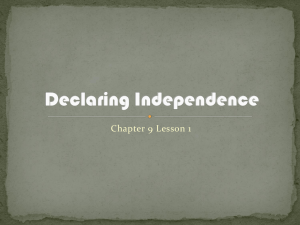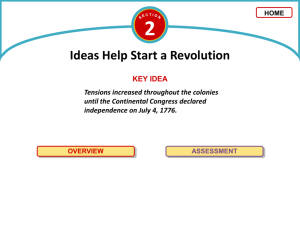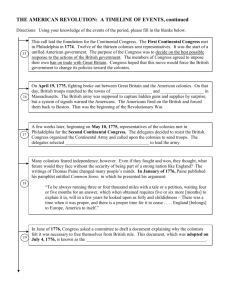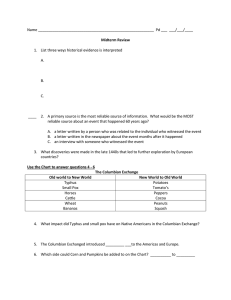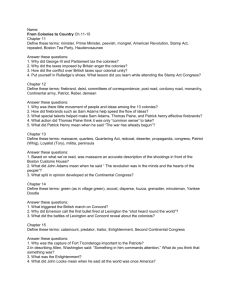common sense paine analysis
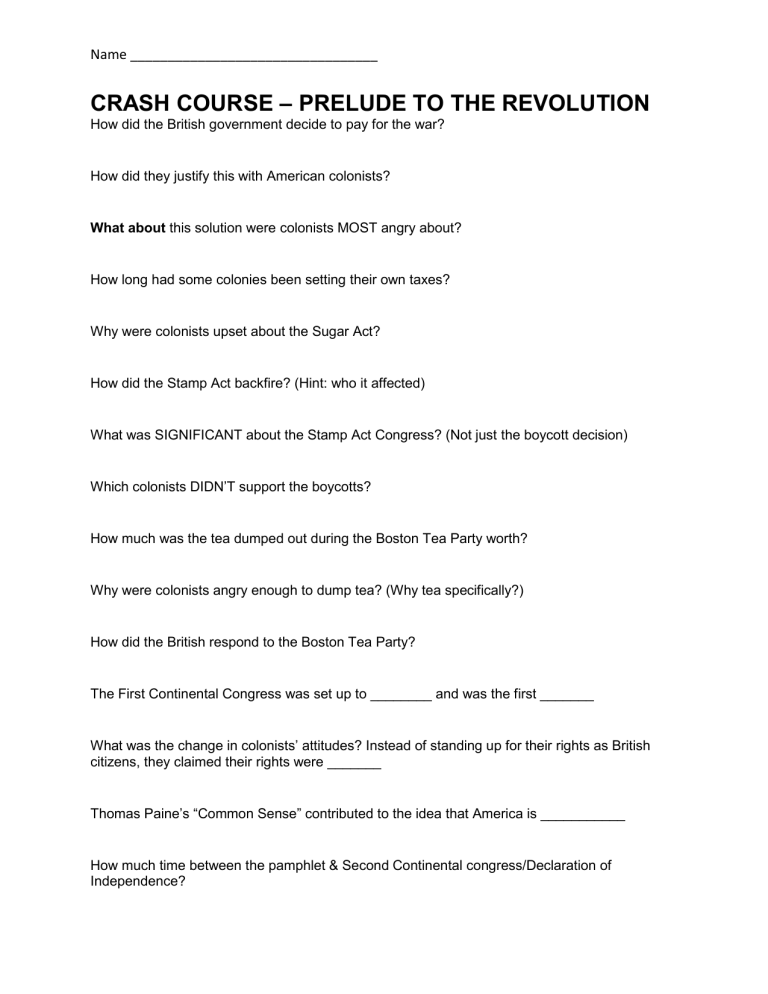
Name _________________________________
CRASH COURSE – PRELUDE TO THE REVOLUTION
How did the British government decide to pay for the war?
How did they justify this with American colonists?
What about this solution were colonists MOST angry about?
How long had some colonies been setting their own taxes?
Why were colonists upset about the Sugar Act?
How did the Stamp Act backfire? (Hint: who it affected)
What was SIGNIFICANT about the Stamp Act Congress? (Not just the boycott decision)
Which colonists DIDN’T support the boycotts?
How much was the tea dumped out during the Boston Tea Party worth?
Why were colonists angry enough to dump tea? (Why tea specifically?)
How did the British respond to the Boston Tea Party?
The First Continental Congress was set up to ________ and was the first _______
What was the change in colonists’ attitudes? Instead of standing up for their rights as British citizens, they claimed their rights were _______
Thomas Paine’s “Common Sense” contributed to the idea that America is ___________
How much time between the pamphlet & Second Continental congress/Declaration of
Independence?
Name _________________________________
Analyzing Thomas Paine’s Common Sense
Directions : Read the selected passages and answer the questions that follow in complete
sentences.
INTRODUCTION
Perhaps the sentiments contained in the following pages, are not YET sufficiently fashionable to procure them general favour; a long habit of not thinking a thing WRONG, gives it a superficial appearance of being RIGHT, and raises at first a formidable outcry in defense of custom. But the tumult soon subsides. Time makes more converts than reason.
As a long and violent abuse of power, is generally the Means of calling the right of it in question (and in Matters too which might never have been thought of, had not the Sufferers been aggravated into the inquiry) and as the King of England hath undertaken in his OWN RIGHT, to support the Parliament in what he calls THEIRS, and as the good people of this country are grievously oppressed by the combination, they have an undoubted privilege to inquire into the pretensions of both, and equally to reject the usurpation of either.
In the following sheets, the author hath studiously avoided every thing which is personal among ourselves. Compliments as well as censure to individuals make no part thereof. The wise, and the worthy, need not the triumph of a pamphlet; and those whose sentiments are injudicious, or unfriendly, will cease of themselves unless too much pains are bestowed upon their conversion.
The cause of America is in a great measure the cause of all mankind. Many circumstances hath, and will arise, which are not local, but universal, and through which the principles of all
Lovers of Mankind are affected, and in the Event of which, their Affections are interested. The laying a Country desolate with Fire and Sword, declaring War against the natural rights of all
Mankind, and extirpating the Defenders thereof from the Face of the Earth, is the Concern of every
Man to whom Nature hath given the Power of feeling; of which Class, regardless of Party Censure, is the AUTHOR.
Philadelphia, February 14, 1776
THOUGHTS ON THE PRESENT STATE OF AMERICAN AFFAIRS
…Thousands are already ruined by British barbarity; (thousands more will probably suffer the same fate.) Those men have other feelings than us who have nothing suffered. All they NOW possess is liberty, what they before enjoyed is sacrificed to its service, and having nothing more to lose, they disdain submission. Besides, the general temper of the colonies, towards a British government, will be like that of a youth, who is nearly out of his time; they will care very little about her. And a government which cannot preserve the peace, is no government at all, and in that case we pay our money for nothing; and pray what is it that Britain can do, whose power will be wholly on paper, should a civil tumult break out the very day after reconciliation! I have heard some men say, many of whom I believe spoke without thinking, that they dreaded an independence, fearing that it would produce civil wars. It is but seldom that our first thoughts are
Name _________________________________ truly correct, and that is the case here; for there are ten times more to dread from a patched up connection than from independence. I make the sufferers case my own, and I protest, that were I driven from house and home, my property destroyed, and my circumstances ruined, that as man, sensible of injuries, I could never relish the doctrine of reconciliation, or consider myself bound thereby.
The colonies have manifested such a spirit of good order and obedience to continental government, as is sufficient to make every reasonable person easy and happy on that head. No man can assign the least pretence for his fears, on any other grounds, than such as are truly childish and ridiculous, viz. that one colony will be striving for superiority over another.
Where there are no distinctions there can be no superiority, perfect equality affords no temptation. The republics of Europe are all (and we may say always) in peace. Holland and
Switzerland are without wars, foreign or domestic: Monarchical governments, it is true, are never long at rest; the crown itself is a temptation to enterprising ruffians at HOME; and that degree of pride and insolence ever attendant on regal authority, swells into a rupture with foreign powers, in instances, where a republican government, by being formed on more natural principles, would negotiate the mistake.
…LET the assemblies be annual, with a President only. The representation more equal. Their business wholly domestic, and subject to the authority of a Continental Congress.
Let each colony be divided into six, eight, or ten, convenient districts, each district to send a proper number of delegates to Congress, so that each colony send at least thirty. The whole number in Congress will be at least 390. Each Congress to sit and to choose a president by the following method. When the delegates are met, let a colony be taken from the whole thirteen colonies by lot, after which, let the whole Congress choose (by ballot) a president from out of the delegates of that province. In the next Congress, let a colony be taken by lot from twelve only, omitting that colony from which the president was taken in the former Congress, and so proceeding on till the whole thirteen shall have had their proper rotation. And in order that nothing may pass into a law but what is satisfactorily just not less than three fifths of the Congress to be called a majority— He that will promote discord, under a government so equally formed as this, would have joined Lucifer in his revolt.
Analyzing Common Sense
1. Paine admits in the first paragraph that his argument might be seen as unpopular. What do you think he means when he writes, “time makes more converts than reason”?
Name _________________________________
2. According to Paine, why is it important for America to exercise its right for independence and what implications (consequences/results) does this have for other colonial countries and the world?
3. What are Britain’s apparent weaknesses and why is ‘reconciliation’ between America and Britain not possible?
4. Paine writes of his disapproval of monarchies. List his reasons.
5. What type of government does Paine want for America? How would it be structured?
6. How would this new form of government be safer and more democratic for America than a monarchial form of government?


